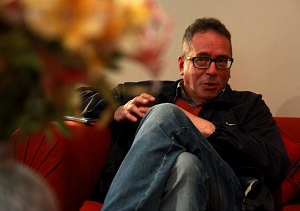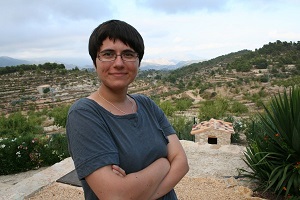De Argentijnse schrijver en vertaler César Aira werd geboren op 23 februari 1949 in Coronel Pringles. Zie ook alle tags voor César Aira op dit blog.
Uit:An Episode in the Life of a Landscape Painter (Vertaald door Chris Andrews)
“The horse did indeed rise to its feet, bristling and monu-mental, obscuring halfthe mesh oflightning, his giraffe-like legs contorted by wayward steps; he turned his head, hear-ing the call of madness … and took off … But Rugendas went with him! He could not understand, nor did he want to—it was too monstrous. He could feel himself being pulled, stretching (the electricity had made him elastic), almost levitating, like a satellite in thrall to a dangerous star.The pace quickened, and off he went in tow, bouncing, bewildered … What he did not realize was that his foot was caught in the stirrup, a classic riding accident, which still occurs now and then, even afterso many repetitions.The generation of electricity ceased as suddenly as it had begun, which was a pity, because a well-aimed lightning bolt, stopping the creature in its flight, might have spared the painter no end of trouble. But the current withdrew into the clouds, the wind began to blow, rain fell … It was never known how farthe horse galloped, nor did it really matter.Whateverthe distance,shortorlong,thedisas-ter had occurred. Itwas not until the morning ofthe follow-ing day that Krause and the old guide discovered them.The horse had found his clover, and was grazing sleepily, with a bloody bundle trailing from one stirrup. After a whole night spent looking for his friend, poor Krause, at his wits’ end, had more or less given him up for dead. Finding him was not entirely a relief: there he was, at last, but prone and motionless.They hurried on and, as they approached, saw him move yet remain face down, as if kissing the earth; the flicker of hope this aroused was quenched when they real-ized that he was not moving himself, but being dragged by the horse’s blithe little browsing steps. They dismounted, took his foot from the stirrup and turned him over …The horror struck them dumb. Rugendas’s face was a swollen, bloodymass;theboneofhisforehead wasexposed and strips of skin hung over his eyes. The distinctive aquiline form of hisAugsburg nosewas unrecognizable,and his lips,splitand spread apart, revealed his teeth, all miraculously intact. The first thing was to see if he was breathing. He was. This gave an edge of urgency to what followed. They put him on the horse’s back and set off. The guide, who had re-covered hisguiding skills,rememberedsomeranchesnearby and pointed the way. They arrived half way through the morning, bearing a gift that could not have been more dis-concerting for the poor, isolated farmers who lived there. It was, at least, an opportunity to give Rugendas some simple treatment and take stock of the situation.They washed his face and tried to put it back together, manipulating the pieces with their fingertips; they applied witch hazel dress-ings to speed the healing and checked that there were no broken bones.“

César Aira (Coronel Pringles, 23 februari 1949)

